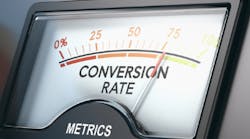Dental Industry Marketing: 4 ways to convert more online dentist leads into conversations
Does it seem like your sales and marketing teams spend countless hours following up with online leads, but are left with little to show for their efforts? You're not alone. It’s a common frustration felt not only in the dental industry, but across all business-to-business sectors.
An astounding $10 billion was spent on content marketing in 2016,1 but that doesn’t mean online success comes easily. Increasing conversions from online leads can't happen without first building a solid foundation. This includes:
- targeted strategies
- landing page optimization
- having the right internal systems in place
For dental marketers who feel they have all the right components for their online campaigns, but are still lacking when it comes to getting dentists on the phone with their sales teams, here are four ideas to help convert requests into appointments.
Encourage your prospects to schedule their appointments online
There are many dental marketing executives who, out of complete frustration, ultimately begin to question the quality of online leads. Conversion issues will crop up if:
- Your strategy isn’t targeted enough
- Your sales process isn’t shored up
- Your salespeople aren’t well-incentivized
- Your marketing automation system isn'tt firing on all cylinders
However, it’s important to remember that if a verified dentist has actually taken the time to fill out a contact form, whether through a landing page or via your website, then the dentist is (or at least was) truly interested in learning more about your product or service.
Why not eliminate a barrier to success and make it easy for dentists to schedule a phone conversation or an online demo with your sales team? You can do this by automating the appointment process. Products like Calendly allow the prospect to access your calendar (only the parts you want them to see) and immediately schedule a phone call with you. It saves salespeople from wasting valuable time on back-and-forth email exchanges trying to schedule follow-up calls.
Even better, by giving prospects the power to schedule their own appointments, you are allowing them to indicate that they are a highly qualified leads who truly want to have a buying-oriented conversation.
Connect immediately via text message
Communicating with prospects via text message may once have sounded unprofessional. However, in today's marketing landscape, texting is an essential sales and marketing communication tool. Using text messaging for business purposes has officially gone mainstream in the world of business-to-business sales. This is particularly true in the dental industry, where a dental practice's primary decision-maker carries a mobile device 24-7—but does not typically spend any significant portion of the day sitting at a desk near a landline.
Consider these statistics:
- Texting in the sales process with a qualified lead can increase conversions over 100%.2
- Response rates from texts are 209% higher than those from phone calls.3
- Texts have a 99% open rate.4
Dentists don’t have extra time to spend on the phone, and they’re bombarded with a steady stream of sales and marketing emails in their personal and business inboxes. Texting, on the other hand, is immediate, easy, and surprisingly personal.
Experts agree that texting is most effective when combined with phone call and/or email outreach. But as the numbers above indicate, text messaging deserves a place in your online follow-up process. And remember, texting is only for valid prospects already in your marketing pipeline who have personally provided your company with their mobile number for sales or marketing purposes.
Some examples of how and when to text your prospects:
- To acknowledge receipt of requests, which should be done immediately after they have submitted an information or demo request via a landing page or web form
- To attempt to schedule a demo when unable to reach them by phone
- To confirm a demo time and date previously set
- To remind them of a commitment. If a dentist appears to be no-show, text him or her five minutes after the appointment time to establish that you are still waiting on the line for them to join the call.
Personalize your sales pitch to address each prospect's needs
This may sound like Sales 101, but it is surprising how many sales people immediately launch into their memorized spiel as soon as they get a dentist on the phone. Here's the thing—the person on the other end of the line likely already knows at least a little bit about your product or service. That’s why they filled out your form in the first place!
You'll find that your conversion rate will quickly improve simply by asking open-ended questions, listening, and responding to the specific reasons why that particular dentist contacted you. It may help to remind a prospect how he or she first connected with you (the headline or offer on your landing page that he or she responded to, the name of the tradeshow where you met, etc.).
Before making that call, you should know what the dentist was responding to. Was it a web form requesting more information about an upcoming event? Or perhaps it was a landing page on how your company helps solve a problem? Those would be very different conversations than with a client who requested a free sample of your product, for example.
In any case, use the specific message that generated the doctor's interest as a jumping off point for the conversation—rather than simply going into the general pitch about your company's products and services.
The reality is that people who have responded to your company's advertising may or may not remember your brand, but often will remember the specific topic the ad touched on that piqued their interest.
Drip, drip, drip
Finally, don’t forget the importance of an email drip campaign. The purpose of the campaign should be twofold:
- Reinforcing the sometimes tenuous link between the landing page they responded to and to your brand in general
- Linking the doctor's request to the inevitable return phone call, email, or series of communications that the doctor will be receiving from your company to follow up on their initial request
Also, look for new and interesting ways that marketing automation is evolving. I'll give you a case study from my company as an example:
In order to help our clients convert more dentist leads into substantive conversations, we developed a value-added marketing automation feature that's included with all our campaigns. It includes a series of three emails that go out to those dentists who have already requested more information from a company via the campaign’s landing page. These customized email-marketing automation campaigns are written, designed, and sent by us, but they are branded for each of our clients. These drip emails have the specific goal of linking the landing page content to the client and the phone call each dentist will receive from the client's sales team. Based on client feedback, our theory is as follows:
- Sometimes when a dentist fills out a contact form, the reason why he or she filled it out doesn’t stick, even just a few hours later.
- Our three successive emails serve to reinforce the landing page message that dentists who filled out the online form conscientiously responded to.
- The goal is to make those dentists' connections with our clients' brand messages (and their contact requests) stronger, deeper, and less tenuous.
- If dentists better remember how, why, or where they requested a demo in the first place (because we reinforced it multiple times via the drip campaign), they will be that much more likely to take a sales call from the company and to buy as a result.
- Plus, it gives our clients three additional opportunities for an automated call to action to the dentists who have already engaged with their brands regarding setting an appointment.
These are just a few tactics that dental marketers can employ to help improve conversion rates from online campaigns. Take them and watch your online conversion rate jump!
Author's note: Many dental companies and manufacturers continue to struggle with finding their true audience online. That’s why more dental executive teams are turning to Doctor Distillery to help them reach a qualified network of more than 180,000 verified dentists, allowing them to execute extremely targeted, more effective online campaigns, ensuring that their sales and marketing teams always have highly-qualified dentist leads to follow up with.
References
1. Skinner R. US Marketers Spent More than $10 Billion On Content in 2016. Forrester website. https://go.forrester.com/blogs/17-01-16-us_marketers_spent_more_than_10_billion_on_content_in_2016/. Published January 16, 2017. Accessed January 29, 2018.
2. Text messaging for better sales conversion. Study published online by Velocify. http://pages.velocify.com/rs/leads360/images/Text-Messaging-for-Better-Sales-Conversion.pdf. Accessed January 29, 2018.
3. Burke K. Crucial New Study Brings Light to Franchise Texting. Text Request website. https://www.textrequest.com/blog/crucial-new-study-brings-light-to-franchise-texting/. Published February 29, 2016. Accessed January 29, 2018.
4. Burke K. Free: Your Complete Guide to Successful Business Texting / SMS Online. https://www.textrequest.com/blog/complete-overview-business-texting/. Published May 3, 2016. Accessed January 29, 2018.
MORE DENTAL INDUSTRY MARKETING:
Why focusing solely on lead generation blurs your marketing vision
The industry's best kept secret for getting more dentists on the phone
5 pitfalls product managers can avoid when marketing to dentists online
Dental Industry Marketing is a periodic column by Naomi Cooper that appears in the Apex360 e-newsletter.
Editor's note: This article first appeared in the Apex360 e-newsletter. Apex360 is a DentistryIQ partner publication for dental practitioners and members of the dental industry. Its goal is to provide timely dental information and present it in meaningful context, empowering those in the dental space to make better business decisions.
Not a subscriber? Subscribe to the Apex360 e-newsletter here.
Dental news and press releases may be sent to Apex360 editors at [email protected]">[email protected].











